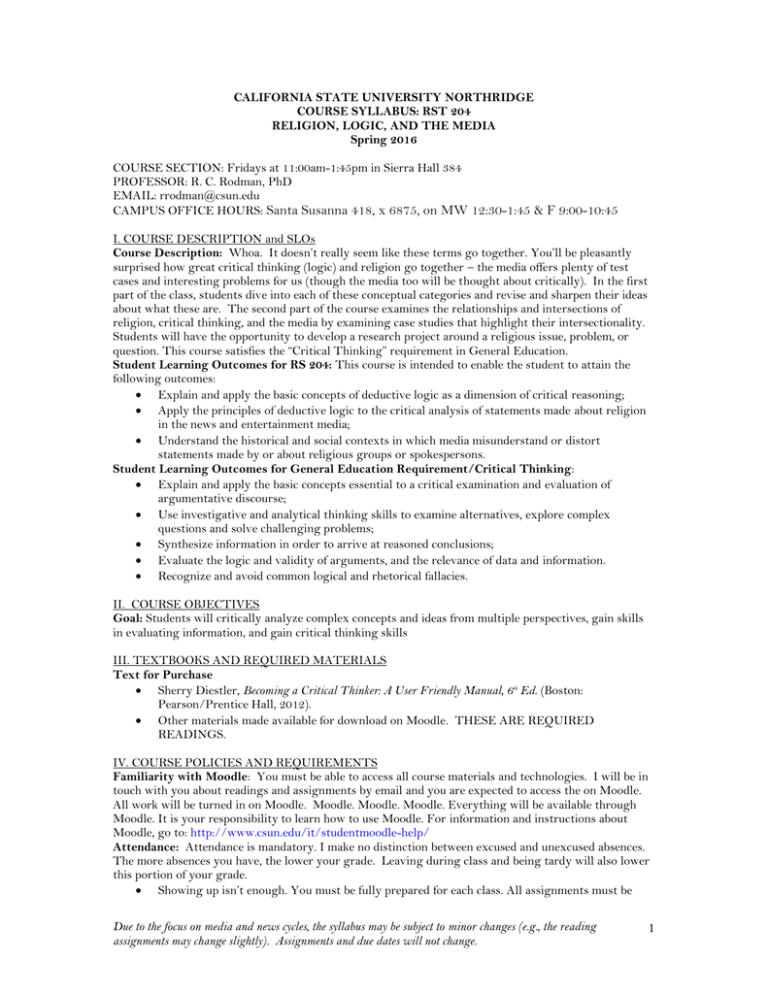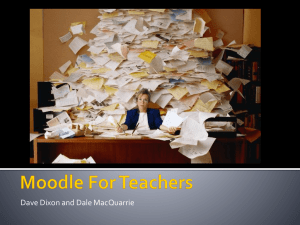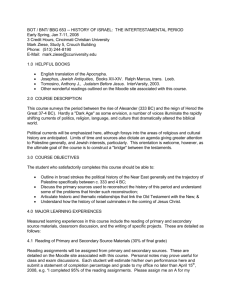
CALIFORNIA STATE UNIVERSITY NORTHRIDGE
COURSE SYLLABUS: RST 204
RELIGION, LOGIC, AND THE MEDIA
Spring 2016
COURSE SECTION: Fridays at 11:00am-1:45pm in Sierra Hall 384
PROFESSOR: R. C. Rodman, PhD
EMAIL: rrodman@csun.edu
CAMPUS OFFICE HOURS: Santa Susanna 418, x 6875, on MW 12:30-1:45 & F 9:00-10:45
I. COURSE DESCRIPTION and SLOs
Course Description: Whoa. It doesn’t really seem like these terms go together. You’ll be pleasantly
surprised how great critical thinking (logic) and religion go together – the media offers plenty of test
cases and interesting problems for us (though the media too will be thought about critically). In the first
part of the class, students dive into each of these conceptual categories and revise and sharpen their ideas
about what these are. The second part of the course examines the relationships and intersections of
religion, critical thinking, and the media by examining case studies that highlight their intersectionality.
Students will have the opportunity to develop a research project around a religious issue, problem, or
question. This course satisfies the “Critical Thinking” requirement in General Education.
Student Learning Outcomes for RS 204: This course is intended to enable the student to attain the
following outcomes:
Explain and apply the basic concepts of deductive logic as a dimension of critical reasoning;
Apply the principles of deductive logic to the critical analysis of statements made about religion
in the news and entertainment media;
Understand the historical and social contexts in which media misunderstand or distort
statements made by or about religious groups or spokespersons.
Student Learning Outcomes for General Education Requirement/Critical Thinking:
Explain and apply the basic concepts essential to a critical examination and evaluation of
argumentative discourse;
Use investigative and analytical thinking skills to examine alternatives, explore complex
questions and solve challenging problems;
Synthesize information in order to arrive at reasoned conclusions;
Evaluate the logic and validity of arguments, and the relevance of data and information.
Recognize and avoid common logical and rhetorical fallacies.
II. COURSE OBJECTIVES
Goal: Students will critically analyze complex concepts and ideas from multiple perspectives, gain skills
in evaluating information, and gain critical thinking skills
III. TEXTBOOKS AND REQUIRED MATERIALS
Text for Purchase
Sherry Diestler, Becoming a Critical Thinker: A User Friendly Manual, 6th Ed. (Boston:
Pearson/Prentice Hall, 2012).
Other materials made available for download on Moodle. THESE ARE REQUIRED
READINGS.
IV. COURSE POLICIES AND REQUIREMENTS
Familiarity with Moodle: You must be able to access all course materials and technologies. I will be in
touch with you about readings and assignments by email and you are expected to access the on Moodle.
All work will be turned in on Moodle. Moodle. Moodle. Moodle. Everything will be available through
Moodle. It is your responsibility to learn how to use Moodle. For information and instructions about
Moodle, go to: http://www.csun.edu/it/studentmoodle-help/
Attendance: Attendance is mandatory. I make no distinction between excused and unexcused absences.
The more absences you have, the lower your grade. Leaving during class and being tardy will also lower
this portion of your grade.
Showing up isn’t enough. You must be fully prepared for each class. All assignments must be
Due to the focus on media and news cycles, the syllabus may be subject to minor changes (e.g., the reading
assignments may change slightly). Assignments and due dates will not change.
1
read prior to the class they are assigned, and all readings must be brought to class.
You must fully participate in the class by asking/answering questions, fully participating in
discussions, and fully engaging in any other activity of the class.
Please make sure you attend to your personal needs before or after the class. You may not leave
during class. No cell phones, texting, or Internet use for anything other than class work.
Written Work: Your writing must meet basic scholarly standards appropriate for university level work.
Not only does this include proper grammar, punctuation, and syntax, but also serious reflection on your
topic. There are many sources to help you with your writing assignments. The most important is the
Writing Program at CSUN’s Learning Resource Center, Room 408, Bayramian Hall, 818-677-2033 or go
to: http://www.csun.edu/lrc/writing.html.
Deadlines: Because due dates are stated at the outset, all papers/assignments must be turned in or
posted on Moodle on the date listed. Late work will be dropped a full point or grade for every day late,
beginning immediately after the work is due.
Plagiarism/Cheating: Any evidence of plagiarism will result in a failing grade, certainly for the item
plagiarized, but also for the course. Plagiarism is one form of cheating, but not the only one. Other
examples include “borrowing” stealing, buying or otherwise procuring papers and exams, or having
someone else take an exam or write an essay for which you take credit. All instances of cheating will
result no credit for the assignment and follow up with the Dean’s office.
Special Accommodations: If you have a documented learning disability and/or a physical disability and
need special accommodations in order to complete course requirements, please make sure the instructor is
informed. I will happily work with you on suitable accommodations.
Contact with the Professor: My office hours are posted above. I look forward to working with each of
you in class and on an individual basis. Therefore, I urge you to take advantage of my office hours. I am
happy to discuss any aspect of this course with you, and help you with the assignments. I especially urge
you to contact me if you are confused about the course or an assignment. Really successful students ask
questions! Please contact me by email, in class, or during office hours with your questions, comments, or
requests.
V. ASSESSMENT
Point system
Attendance & participation: 15 (0-2 = 15; 3 = 14; 4 = 13; 5 = 12; 6 = 11; 7 = 10; 8 = 8; 9= 5; 10
or more absences = 0). Again, I do not distinguish between excused and unexcused absences);
you lose partial points for being late/leaving early; texting in class and not participating or
contributing in class.
Quizzes: 3 x 10 = 30
Project Proposal & Presentation: 5
Case study essay drafts: 3 x 5 = 15
Case study essay portfolios: 35
TOTAL = 100 points
Letter Grade Allocation
95-100 A
90-94
A 87-89
B+
83-86
B
80-82
B 77-79
C+
73-76
C
70-72
C 60-69
D
VI. SCHEDULE
Week of Jan 25
Introduction to the Course
Due to the focus on media and news cycles, the syllabus may be subject to minor changes (e.g., the reading
assignments may change slightly). Assignments and due dates will not change.
2
Weeks of Feb. 1-21
Module 1 What is Religion? How and Why Do We Study It?
All the reading will be posted on Moodle
January 29 “10 Things Every College Student Should Know About Religion”
Feb. 5th Russ McCutcheon, “What is the Academic Study of Religion?” and Ninian Smart, The
Religious Experience, Introduction
Feb. 12 Mallory Nye, Religion, The Basics, Chap. 1 & 2
Feb. 19th – NO CLASS – Online quiz will cover ALL the readings
Weeks of Feb. 22-March 6
Module 2 What is an Argument? What Is Logic? What is Critical Thinking?
Feb. 26th Arguments and Reasoning – Diestler, 3-11; 75-97; 120-124
March 4th What Makes Arguments Strong and What Weakens Them, Diestler
March 11th Quiz will cover all the readings since the prior quiz
Weeks of March 14-28
Module 3 Media Print, televised and film
March 18 Print media -- Language, headlines, content, photos, bias - Diestler
SPRING BREAK MARCH 21-27
April 1 Television & film: framing, editing, lighting, setting, staging – Diestler, and “Film
Analysis” reading posted on Moodle
April 3 Online quiz due before midnight on all readings since the prior quiz
Week of April 4
Module 4 Group Projects
April 8 Group project on social media: proposals & presentations due
Weeks of April 11-May 1
Module 5 Case Studies
April 15 – Case Study #1 Print Media
Read: John Cassidy, “Jeb Bush and the Return of Voodoo Economics,” The New Yorker, Sept. 10,
2015.
Read: Jeffrey E. Anderson, The Voodoo Encyclopedia, introduction
Read: TBA
Draft essay on Voodoo Economics due before midnight on April 17
April 22 – Case Study #2 Televised media
Watch: TBA
Watch TBA
Draft essay on presidential candidates and religion due before midnight on April 24
April 29 - Case Study #3 Film
Watch film TBA
Watch film TBA
Draft essay on film due before midnight on May 1
Weeks of May 2-8
Module 6 Final Projects
May 6 Writing workshop for polishing cases studies OR independent research/preparation
May 13 - Case Study #4 -- Group presentations (Last day of class)
Portfolios due May 18th before 10AM to TurnItIn
What I Expect From You
OUR CLASS CONTRACT
What You Can Expect From Me
Due to the focus on media and news cycles, the syllabus may be subject to minor changes (e.g., the reading
assignments may change slightly). Assignments and due dates will not change.
3
You will treat everyone in class, including the professor,
with respect and courtesy due all human beings.
I will treat you with the respect and courtesy due all human
beings.
You will attend every class, give your full attention to the I will attend every class, give my full attention to the
material, and conduct yourself in an appropriate manner. material and conduct myself in an appropriate manner.
You will agree to do the work outlined in the syllabus on
time.
I will return your work in a timely fashion.
You can ask for help.
I will assist you in any way I can, and make myself available
to you via office hours. You can expect a response to email
within 24 hours except in rare cases.
You will acknowledge that your perception of effort, by
itself, is not enough to justify a distinguished grade.
I will not discriminate against you on the basis of your
identity or your well-informed viewpoints.
You will prepare carefully for every class.
I will prepare carefully for every class.
You will not plagiarize, cheat, copy, double-dip, or steal
the work of others.
I will pursue the maximum punishment for plagiarism,
cheating, and other violations of academic integrity.
You will not make excuses for your failure to do what you I will keep careful records of your attendance, performance,
ought; you will accept the consequences – good and bad – and progress.
of your actions.
Due to the focus on media and news cycles, the syllabus may be subject to minor changes (e.g., the reading
assignments may change slightly). Assignments and due dates will not change.
4




